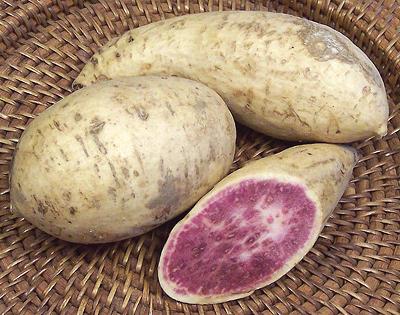 ["Purple Yam" (improper), Hawaiian Sweet Potato; Uala (Hawaii);
Kara-mmu (Japan); C. Ipomoea batatas cv. ayamurasaki]
["Purple Yam" (improper), Hawaiian Sweet Potato; Uala (Hawaii);
Kara-mmu (Japan); C. Ipomoea batatas cv. ayamurasaki]
These light beige skinned sweet potatoes were carried from the American tropics to the Philippines and China by the Spanish, reaching Okinawa around 1600. They are now grown on the Japanese main islands, but still considered "Okinawan", with the Murasaki considered Japanese". They are quite available in Asian markets here in Los Angeles, always confusingly labeled "Purple Yam". Real Purple Yams are not currently much available in North America. The purple color comes from anthocyanin flavonoids, which have antioxidant properties, but how well these survive digestion is debatable.
Young leaves and shoots are also edible and called Kandaba in Okinawa. They are used in miso soups and as a vegetable side dish, or in recipes as are other greens.
More on Sweet Potatoes.
This sweet potato is moderately sweet and can be used the same as white or orange sweet potatoes. The flesh is a bit starchy, closer to a real yam than most sweet potatoes.